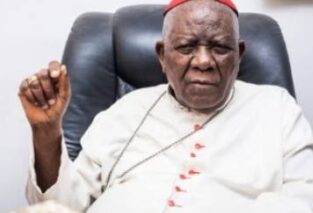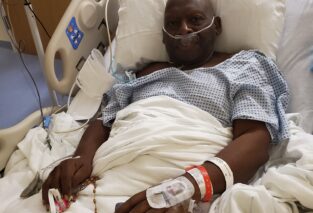Nestor, not his real name, is a taxi driver in Bamenda. I prefer not to mention his real name for fear he might be harassed and accused of supporting secession, if his story were to be known to the forces of repression that seem to smell a ‘secessionist’ in every young Anglophone in every hidden corner of this part of our land – this “land of promise, land of glory.” Where is the promise, where is the glory!?
Nestor is a young man, I guess in his early thirties. He is a father of four, all below the age of ten. He is the first born in a family of five and he is the only breadwinner of his family. His dad passed on several years ago and he was, up until two months ago, the keeper of his old mother, whom he buried recently.
This is how I met Nestor. A few years ago, I was at the motor park in Nkwen looking for a taxi that would drop me at my favourite hub in town, Blessed Paul VI Memorial Pastoral Center at Mendankwe. I came into town from Kumbo, tired and dusty from the bumpy, pothole-ridden stretch of the historic Ring Road from Ndop to the top of the Sabga hill. As I pulled my bag from the vehicle I came in, a shy-looking young man, with smile on his face, walked up to me and asked if I needed a taxi; and, indeed, I did. He asked where I was going and said he could drop me there. He then inquired if I had another piece of luggage; the answer being negative, he took my bag and led the way to his taxi packed a few feet away.
What struck me as I took a seat in his taxi was how clean it was, contrary to many that ply our poorly-maintained city roads throughout the country. A sweet scent of perfume wafted through his taxi, accompanied by beautiful, ear-tickling, feet-tapping and head-nodding Christian music, typically Nigerian in style, with numerous “Alleluias” and “Yahwehs” and “Jehovas” punctuating the rhythm that streamed so flawlessly from the speakers. When you emerge from some of the ‘clandos’ that ply the Kumbo–Bamenda road, generally at breakneck speed, with drivers seemingly oblivious to the countless blind twists and turns along the way, not to mention the bumps in and out of countless potholes in the Ndop plain, and the horrendous stretch that leads up the Sabga hill, you heave a sigh of relief when you are fortunate, as I was, to find a taxi driver, like Nestor, whose car was clean and sweetly scented, with ear-tickling gospel music to boot.
After he dropped me at my destination, I paid him the agreed fee and then asked if he would be available to serve as my driver for the few days I would be in town. He happily agreed, left me his phone contact and our relationship has been a smooth one since then. Each time I come into town, without a car of my own, I always give him a call and he drives me around.
I have always been careful not to pry into people’s private lives but I could not help asking Nestor how he came to be a taxi driver. He is a soft-spoken young man with an easy smile. He told me that he came from a poor family and his dad, who has already transitioned, did not have the money to send him and his other three siblings to secondary school. He, being the eldest of them all, dropped out of school and learned to drive. He was able to buy his taxi from the little money his dad had left behind, and what he himself had earned driving someone else’s taxi. With the earnings from his own taxi, he was able to send his kid brother and his two sisters to secondary and high schools, and keep his own four kids in primary school, and take care of his mother in the village. I told him he looked too young to be a father of four and he put down his head, an easy-flowing smile on his lips.
That was our first contact some years ago, before the recent madness that has grabbed our country, with the tragic consequences for many poor people in Anglophone Cameroon. A few weeks ago, I travelled to Bamenda for the first time by Camairco, the much-touted “Star of Cameroon”, our national airline that has sprung, like a sphinx, from the ashes of the defunct, much-maligned and poorly-run national carrier, Cameroon Airlines. I reserve any comment on my first Camairco flight experience for later. Suffice it to say that we did make it to Bamenda in one piece. I had, earlier that day, called Nestor to find out if he was in town. The answer being affirmative, I asked him to pick me up at the Bamenda airport around 9:30, the flight having been scheduled for take-off from Douala at 8:40. It was not at all surprising that we finally left at 2 p.m. When it was announced that the flight would be delayed “for technical reasons,” I called Nestor to go about his business, and that I would call him later if, and when, we ever took off.
As we prepared for take-off, I gave him a call and asked him to go to the airport. He was there when we arrived, with his usual shy smile, expressing his joy at seeing me again. I told him I was equally delighted to meet him again. But then I noticed that the taxi he was driving did not quite look like the one I knew. We were barely out of the airport when I asked him how the new year was starting for him. He simply said it was starting well. How about his family? He said everyone was well, thank God. Then, after a short moment of silence, he suddenly said “Pa, dis year no really start fine for me at all.” I asked why. For an answer, he pulled the car to the side of the road, took out his phone, flipped through it for a minute and showed me a picture of a vehicle completely consumed by fire. It was nothing but a mass of charred iron. Then he turned to me and said “Na dat my taxi dis-ooh, Pa.” I was stunned and asked what happened. His voice became choked with tears and for a moment we just sat in silence as he tried hard to control himself. “But na who get dis one were you di drivam now,” I asked, looking around and it was clear that it was a far cry from the one I knew. The one we were in was visibly beaten and it was clear that its owner did not take as much care of it as Nestor did his.
“Na some my friend he motor dis,” he said before telling me what had happened. A few months earlier, Bamenda was rife with tension as the forces of “law and order” tossed tear-gas canisters into groups of rioting youth, who responded with burning tires and whatever else they could lay their hands on. For several days, Bamenda was a battleground, and few, if any, dared to venture outside. Since he and his family live outside the city, Nestor was able to smuggle them to his village of Pinyin in Santa Subdivision, away from the chaos of the city. Before leaving town, he entrusted his taxi to a colleague, another driver. When it looked to the young man as if the situation had returned to some form of normalcy, he decided to “try his luck” by venturing out with Nestor’s taxi. Heavily-armed policemen stopped him at one corner, dragged him out of the vehicle, together with his passengers, accused them of being ‘secessionists’ and troublemakers and pushed them into police vans. They took them to the Bamenda prison yard where they were left basking in the sun all day long along dozens of other captives brought there earlier. They were allowed to make phone calls to their relatives to come to their rescue. Those who could make it to the prison yard, rescued their loved ones with hefty sums of money which the extortionists pocketed with no qualms at all. That has been the order of the day in Anglophone Cameroon: poor people are arrested at random, dragged to police or gendarmerie cells and relatives have to bail them out with considerable sums of money. Failure to come up with the required sum, the victims are carted off to the notorious Kondengui prison in Yaounde, the capital city. Woe betide anyone who is unfortunate to enter that prison as he or she would likely be wheeled out of there, feet first.
As Nestor’s friend and other captives languished in the heat, a policeman stealthily set fire to Nestor’s taxi. Before long, what remained of it was just a heap of entangled iron, charred beyond recognition. When this was taking place, Nestor was in his mother’s kitchen in his village. His mother, whose health was already on the downward slope, was basking in the sun outside, watching Nestor’s kids playing in the yard with those of his other relatives. His wife was cooking in the kitchen and he, Nestor, was roasting corn for the kids, who kept running in and out of the kitchen whenever he called them to come for the corn. It was just a normal day in a village setting in the hills of Pinyin, in Santa Subdivision. A calm, peaceful day with the cold wind caressing one’s earlobes and the madness of the Bamenda streets seeming to be light years away. So, no worries, or so it seemed to Nestor. But that was not to be because it was then that his phone rang. The reception not being that clear in the kitchen, he stepped outside to hear better. It was a friend of his at the other end with the bad news that the police had torched his taxi and that nothing was left of it.
The news was so unexpected and so shocking that Nestor screamed out in disbelief. His taxi was the lifeline of his family. That was what was feeding him and his family, his siblings were in school thanks to the proceeds from that taxi; his mother, who was already practically an invalid, survived because of what he earned from his taxi. Now, all that had gone up in flames!! His mother, who was sitting a few feet away from him, was shocked to hear him scream and so was his wife, who ran out of the kitchen to see what had happened. The kids, who had been playing noisily in the yard, all went silent and came near to hear what it was that had made their dad scream out so loud. It was then he told them, audible shock in his voice, that their taxi was no more. His mother then let out a strong scream of her own, made as if to stand up, but then collapsed onto the ground. At first, none of them knew what to do. They all screamed and rushed to raise her off the ground. Then they took her into the house and laid her on her bed. Neighbours, who heard the commotion in the compound, came running to know what had happened. Fortunately, one of them was a nurse who tried to revive her and when all attempts failed, they called for a taxi that rushed her to a nearby clinic.
When Nestor was telling me this story, he had just buried his mother in the village a few weeks before. He has still not forgiven himself for his mother’s death. He believes it was because he screamed out loud on hearing the news, that his mother collapsed and later died. Why did he scream? Why did he not walk away to a safe distance, hear what had happened and then break the news to his family in a calm manner? Why did he not bring his taxi with him to the village as he always did each time he went to visit his mother? Endless questions with no answers. So, the young man is carrying in him and with him a terrible guilt feeling of being responsible for his mother’s demise.
“Does anyone know who set your car on fire?” I asked, not knowing what else to say. He said someone told him it was a policeman, and even volunteered to show him who he was. He even advised Nestor to bring charges against the officer in question. But, Nestor told me he thought that would be an exercise in futility. Did I see him ever winning a case against a policeman in this country in normal times, not to mention now when they roam around like wild beasts, brutalising people, like him, with impunity and extorting money from them?
Not being a good counselor, all I could do was to tell him that he should not consider himself the architect of his mother’s death; that he and his mother were, like us all, the victims of this insensitive war of oppression Mr. Biya and his government are prosecuting against our people. I wonder if I made much sense to him as he merely looked at me with tears in his eyes.
I then asked whose taxi he was driving. He said it was a friend of his. In fact, the next day as he was taking me downtown, someone called from the other side of the road. He pulled over and the man ran up to the car. Nestor sent his hand in his pocket and pulled out some money, which the fellow snatched from his hand and headed for the nearest off-licence bar. I was surprised and asked who it was. He did not look like a policeman at all, they who are infamous extortionists of money from poor taxi drivers. Nestor said the fellow was the owner of the taxi we were in. I could feel humiliation in his voice; he, who was a taxi owner himself only a few months previously, is now working for someone else. Yesterday, he was his own boss, today, he is working for someone else. He is now suffering the indignity of being accosted at a street corner by the taxi owner, who is loitering around a bar, drinking himself silly, and waiting to grab whatever he can bring in. Nestor is another victim of this war of attrition which Mr. Biya is prosecuting against our people. Everyday we hear of how Cameroon is one and indivisible. Let anyone say that to Nestor, and the likes of him, who are stewing in the deep mud of anger and humiliation, throughout Anglophone Cameroon. One and indivisible, indeed!!
Douala, January 31, 2018


